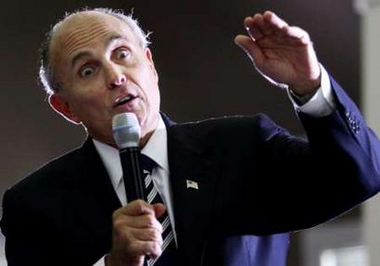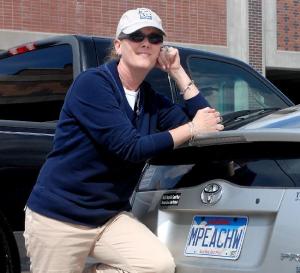Crazy for Rudy
Vanity Fair
Excerpt
 There were, memorably, his bitter fights with anybody in his administration who got more publicity than he did (especially his police commissioner William Bratton, whom he fired because Bratton got credit for the drop in crime); his refusal (more childish and foot-stamping than strictly racist) to meet with virtually any elected black official during his tenure (justified with a series of odd ruminations: “If you engage in dialogue with political leaders that pander … then you end up watering down your change so much that nothing changes”); his jihadish campaign against the Brooklyn Museum of Art over a painting that mocked the Virgin Mary; and his authoritarian campaign against jaywalkers (resulting in formidable street barricades).
There were, memorably, his bitter fights with anybody in his administration who got more publicity than he did (especially his police commissioner William Bratton, whom he fired because Bratton got credit for the drop in crime); his refusal (more childish and foot-stamping than strictly racist) to meet with virtually any elected black official during his tenure (justified with a series of odd ruminations: “If you engage in dialogue with political leaders that pander … then you end up watering down your change so much that nothing changes”); his jihadish campaign against the Brooklyn Museum of Art over a painting that mocked the Virgin Mary; and his authoritarian campaign against jaywalkers (resulting in formidable street barricades).
His own children end up, too, as forlorn figures in his imperial city. Given their parents’ marital discord and the mayor’s nonstop parenting of the city, they were often left in the care of the police (at 37,000 strong, the N.Y.P.D., commanded by the mayor, is the largest force in the U.S.). A subject of both humor and concern among Rudy’s closest aides, the children—Caroline, 18, and Andrew, 21—were on a police diet, too. To keep them happy and quiet, the police stuffed them full of food. Father and children are now estranged—his son pointedly says he won’t campaign for his father, because of his demanding golf-training schedule (he learned the game from a member of his police detail); his daughter seems disinclined to speak of her father at all. (On the other hand, there are, perhaps, so many bad fathers in American politics that it might not damage you even if you turn out to be the worst. Even when the children themselves—and I believe this is the first time this has ever happened in a modern presidential campaign—disavow you.)
And Bernie Kerik. There is no circumstance under which a politician with any sense of vulnerability or accountability or merely the need to maintain a sense of appearances hires Bernie Kerik (no less as the police commissioner). Kerik is from Paterson, New Jersey, where I’m from. He came to live in a house in the suburb just down the road from where my parents lived. I knew or had heard the same stories everyone else—my parents and my parents’ friends—had heard. Which it seems impossible Rudy would not have heard, too. And if, somehow, he hadn’t heard them, we know now from Rudy’s own grand-jury testimony that he was, in fact, officially told—though, he says, it didn’t quite register. In other words, one of the most experienced prosecutors of organized-crime figures has spelled out for him what is widely rumored—that his corrections chief and prospective police commissioner might be Mobbed up—and he doesn’t get it. Yup. And then goes on to become business partners with the guy. And then becomes his sponsor for high federal office.
Let’s not even get into the nature of Rudy’s tolerance for whatever Kerik was into, and just focus on Rudy’s sense of impunity—he’s got no sense of caution. (A likely implosion point for the Rudy campaign is Kerik’s anticipated trial for tax fraud and providing false information to federal authorities when he was vetted for the job of homeland-security chief, which Rudy sponsored him for.) It’s about getting away with it. It’s waving the red flag. It’s his assumption that everybody is a pantywaist, except him














 There were, memorably, his bitter fights with anybody in his administration who got more publicity than he did (especially his police commissioner William Bratton, whom he fired because Bratton got credit for the drop in crime); his refusal (more childish and foot-stamping than strictly racist) to meet with virtually any elected black official during his tenure (justified with a series of odd ruminations: “If you engage in dialogue with political leaders that pander … then you end up watering down your change so much that nothing changes”); his jihadish campaign against the Brooklyn Museum of Art over a painting that mocked the Virgin Mary; and his authoritarian campaign against jaywalkers (resulting in formidable street barricades).
There were, memorably, his bitter fights with anybody in his administration who got more publicity than he did (especially his police commissioner William Bratton, whom he fired because Bratton got credit for the drop in crime); his refusal (more childish and foot-stamping than strictly racist) to meet with virtually any elected black official during his tenure (justified with a series of odd ruminations: “If you engage in dialogue with political leaders that pander … then you end up watering down your change so much that nothing changes”); his jihadish campaign against the Brooklyn Museum of Art over a painting that mocked the Virgin Mary; and his authoritarian campaign against jaywalkers (resulting in formidable street barricades).






